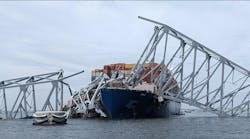If you're wondering what the next big buzzword for supply chain management is, there's a good chance it could be “orchestrate.” True, the word tends to be more closely associated with musical arrangements than logistics operations, but never let it be said that a perfectly good word can't be appropriated to fit whatever definition it might be needed for. Analyst firm Gartner, in particular, seems to have jumped on the orchestration bandwagon with reckless abandon.
In its latest ranking of the 25 most popular supply chain organizations of 2012, for instance, Gartner singles out online retailer Amazon (ranked # 2) as “a great example of an orchestrator that goes beyond simply borrowing and adapting others' best practices and consistently defies conventional wisdom.” Similarly, Hewlett-Packard (ranked # 24) is described as “breaking with established convention in true orchestrator mode” because it moved from coastal to western China in 2008.
Do you see what Gartner did there? Apparently, the word “orchestrator” as used by them means “to expand upon an industry's best practices by creating new best practices,” which is a definition that no currently published dictionary has yet adopted. But of course, coining new phrases – and especially, new three-letter acronyms (TLAs) – is exactly what analyst firms excel at. Take the reliable old chestnut original equipment manufacturer (OEM). Gartner says forget about it; we should now be thinking in terms of an original solutions orchestrator (OSO). One might say then, if one were so inclined, that Gartner itself has orchestrated the meaning of the word orchestration. I certainly hadn't heard the term so used when I wrote my book on supply chain management best practices back in 2010.
In any event, I mention all this because Gartner has just issued a series of predictions related to global logistics, specifically looking at what changes are in store over the next several years, out to the year 2016. And sure enough, wouldn't you know it, our new friend Mr. Orchestration will play a big part in the coming evolution of global logistics. Let's take a look at the predictions.
Prediction 1: By 2016, more than 50% of Global 1000 logistics organizations will be required to systematically report verified emissions and environmental data.
As predictions go, this one is kind of a yawner. Companies will be expected to report their sustainability efforts? That might've made a pretty bold prediction had it been made back in, I don't know, 1991 maybe. Today, you'd have to go pretty far to find somebody who didn't expect this happen. In a recent interview I conducted with Gavin Neath, Unilever's senior vice president of sustainability, he pointed out to me that his company was already so far ahead of some of its stated green goals that Unilever recently reset the bar higher, to stretch even further in its sustainability initiatives.
Prognostication Grade: F, on the grounds that Gartner is predicting something to happen that's already happened.
Prediction 2: By 2016, less than 10% of logistics organizations will have a chief compliance and risk management officer.
This prediction is much more interesting, though Gartner doesn't really explain exactly how they plan to monitor this de-evolution. For instance, what's the percentage of companies that have an executive with this title (or something close to it) right now? Are we to believe that risk itself will diminish over the next few years to the point that nobody will care much about it? That hardly seems likely, given the enormous importance risk management has assumed over the past year or two, with tsunamis, earthquakes, volcano eruptions, nuclear meltdowns, floods, hurricanes and the financial collapse of entire economies dominating the news. It's probably far more likely that, rather than creating a new C-level title for risk managers and effectively creating another silo department, that risk management will become part of the job description of several high-level executives within an organization.
Prognostication Grade: C-, due to an insufficiently explained premise.
Prediction 3: By 2016, 20% of supply chain management organizations will adopt a supply chain execution convergence application strategy.
Wow, try saying that three times fast: supply chain execution convergence application strategy. What exactly does it mean, though? Back in the old days, before Gartner gobbled them up, AMR Research used to talk about supply chain execution as being the logistics/warehousing end of the supply chain. That's where all the TMS (transportation management systems) and WMS (warehouse management systems) vendors ended up, on the supply chain execution (or in TLA-speak, SCE) side. I'm really not sure if Gartner is defining SCE in the same way, or if they're talking about something else entirely. Here's what they say: “Supply chain execution convergence will play a role in helping SCM organizations adopt a platform that allows them to model, orchestrate and synchronize end-to-end logistics processes.” The only thing missing in that explanation is the use of the word “synergy.” If you're going to load up on buzzwords, might as well use all of them.
Prognostication Grade: B+, because even if nobody can figure out exactly what Gartner is talking about, they managed to work “orchestrate” into yet another coming trend.
Prediction 4: By 2016, slower global trade growth will force shippers to adjust from proliferation to optimization of international flows.
Gartner believes that the growth in global trade has slowed down, which is slicing the cheese very thin since all they're really saying is that global trade as a percentage of global GDP will continue to grow, but just not as rapidly as it has in the past. Certainly the global recession (“recession” being optimistic in some instances; “full-scale meltdown” might be closer to the truth for some countries) has slowed growth everywhere, but international trade itself continues to grow. According to the International Monetary Fund (IMF), for instance, the global economy is expected to grow slightly more in 2013 than 2012. The other half of Gartner's prediction – that companies will turn more to supply chain technology to improve their logistics performance – could have been written at any time over the past two decades because, after all, when hasn't it been a good time to improve logistics performance?
Prognostication Grade: C+, on the “tell me something I don't already know” scale.
Final Grade: C. I predict that if Gartner concentrates more on real-world corporate initiatives and less on creating new buzzwords, their predictions will get a better reception from the supply chain community.


